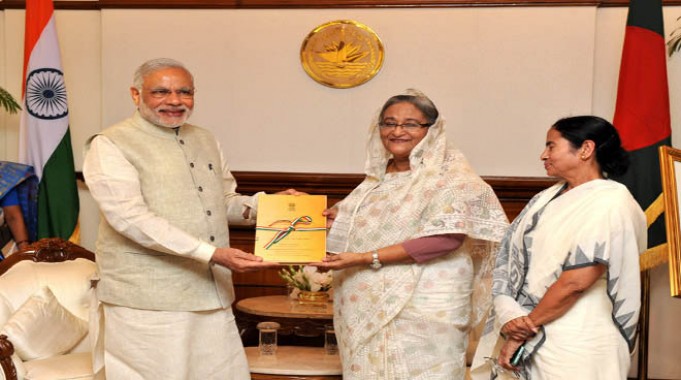Modi's foreign policy triumph?
You don’t say!
Darius Nakhoonwala
Everyone is happy when reasonable expectations are fulfilled. That is why Narendra Modi’s successful trip to Bangladesh has drawn a round of applause from the least relevant people - the editorial writers.
Not one of them had anything critical to say, other than to point out that the proof of the pudding is in the eating i.e, implementation of the various agreements signed. But that’s stating the obvious.
Absolutely the best edit came from the Hindu. It showed a remarkably precise understanding of the various issues, not least of which was the opening line itself: “The People’s Republic of Bangladesh represents one Muslim-majority society where the majority is against it being an Islamic state.”
The edit went on to point out that “Finally, a Prime Minister who had shown deep commitment in the past to a particular religion in his own country, realised that an overwhelming majority in Bangladesh greatly admires India’s political stability and zeal for progress… Bangladesh at large detests militant fanaticism though it has seen severe undercurrents of it over time.”
The edit then also described how Mamata Banerjee - who had sabotaged a similar agreement in 2011 – had been won over. “Mr Modi’s team made Ms. Banerjee understands the geostrategic significance of Bangladesh and how she may indeed expedite her own fall by working against its interests. Thereafter Ms. Banerjee made two quick visits to Dhaka, after having refused to accompany the then Prime Minister on his visit in 2011.”
The rest is detail, to which the other edit writers devoted themselves with the usual banality. I had, for example, expected the Telegraph to write something stellar. After all, it is published largely for a Bengali audience. But the paper failed the test on two counts: it made it the second edit, in a list of two and it was content to focus on the specifics of the agreements. Even there it failed to explain to its readers how these would help the people of West Bengal.
Having accused New Delhi of annoying Bangladesh with its ‘big-brotherly’ attitude, the paper adopted the same tone. “Dhaka would do well to accept the fact that it is in its own interest to try and benefit from a growing Indian economy.” The bhadralok contempt for the bangaal was there for all to see.
The Pioneer took an expectedly euphoric line. “One doesn't have to be a foreign policy expert to realise that Prime Minister Narendra Modi's two-day visit to Bangladesh is slated for the history books.”
It went on to explain why and ended with this fanfare of the trumpets: “A new chapter in the Indian-Bangladesh bilateral is being scripted, and if it works out as planned, we may also be looking at a new development in Indian foreign policy. Too often South Block has let itself be bogged down by the dead weight that is Pakistan. In the process, it has ignored some of its closest friends such as Bangladesh and Nepal, and abandoned its role as a major regional player. Thankfully, those days now seem to be coming to an end.”
The rest of the edits were boringly predictable. The Indian Express said “The larger significance of Modi’s visit is in the demonstration of the potential for transforming the region through a more purposeful and problem-solving neighbourhood policy. The presence of West Bengal Chief Minister Mamata Banerjee signalled that this can be done while engaging state interests and drawing in regional leaders with high stakes in bilateral ties.”
The Times of India said India had allowed its foreign policy to become obsessed by Pakistan instead of looking to other neighbours. It ended the edit with a line about Pakistan: “As the benefits of India-Bangladesh cooperation start trickling in, perhaps the establishment in Islamabad too can be persuaded to drop its radical suspicion of India and end the game of ‘tutu main main’ that bedevils the subcontinent.” It would seem it not just the MEA that obsesses about Pakistan.
The Hindustan Times was the only one to point out that “The other important area of cooperation…is in the field of intelligence sharing about the insurgent activity in the border areas. Bangladesh has been tough on any anti-Indian activity being conducted on its soil, and Mr Modi clearly hopes to build on that.”
Now how did the others miss that?
Such articles are only possible because of your support. Help the Hoot. The Hoot is an independent initiative of the Media Foundation and requires funds for independent media monitoring. Please support us. Every rupee helps.







